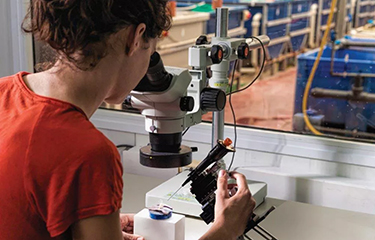A collaboration between Colors Farm, Evogene, and Ben-Gurion University is seeking to develop a gene-editing technology for giant freshwater prawn (Macrobrachium rosenbergii), whiteleg shrimp (Litopenaeus vannamei), and red swamp crayfish (Procambarus clarkii).
Powered by a competitive grant from the Israel Innovation Authority, Hazeva, Israel-based sustainable aquaculture firm Colors Farm is planning to use computational biology solutions from Rehovot, Israel-based Evogene to develop the ability to influence the growth rate, disease resistance, and environmental adaptation of the three species. Ben-Gurion University will develop a gene-editing platform and spearhead the research and development process, according to a press release.
“Gene editing is a powerful tool that can enhance the economics and sustainability of crustacean production. We believe this collaboration will lead to significant advances in the aquaculture industry,” Ben-Gurion University Professor Amir Sagi said.
Evogene plans to contribute predictions for optimal guide RNAs via its GeneRator AI tech-engine, facilitating precise gene editing through CRISPR technology, Evogene CPO Nir Arbel said.
“Through precise modifications of crustacean genomes, gene editing can enhance desired traits and minimize environmental impact,” Arbel said. “We believe that through this collaboration Evogene will be able to leverage its knowledge and algorithmic capabilities, developed in its GeneRator AI tech-engine, to design predictive gene editing solutions for organisms that lack complete and exhaustive genomic and proteomic data. We believe this will open up the gene editing market to many additional agri-tech companies."
Colors Farm “will craft specialized solutions tailored to the gene editing requirements of giant freshwater prawn and whiteleg shrimp,” according to the company’s CEO, Ran Epstein.
"This collaboration represents a major step forward for aquaculture. Gene editing has the power to revolutionize crustacean production, and we are excited to work with Evogene and BGU to turn this potential into reality,” Epstein said.
Epstein called the selection of the three species chosen for the project “strategic,” pointing to the fact that the global shrimp market was valued at USD 66 billion (EUR 61.7 billion) in 2022 and is predicted to increase to USD 88 billion (EUR 82.3 billion) by 2028, while the crayfish market is slated to grow at compound annual growth rate (CAGR) of 4.7 percent from 2023 to 2028, and is currently valued at USD 16.2 billion (EUR 15.1 billion).
“These growing markets are driven by a rising appetite for seafood and an increasing emphasis on sustainable aquaculture practices, making the collaboration exceptionally relevant to meet these demands,” Epstein said.
Photo courtesy of Color Farms







